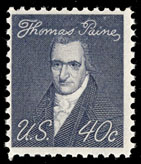Thomas Paine frasi celebri
“La moderazione nel carattere è sempre una virtù, ma la moderazione nei principi è sempre un vizio.”
citato in Elena Spagnol, Citazioni, Garzanti, 2003
I diritti dell'uomo
da The Age of Reason, in Collected Writings, Library of America, New York, 1995, p. 715
Thomas Paine: Frasi in inglese
1790s, Agrarian Justice (1797)
“I offer nothing more than simple facts, plain arguments, and common sense.”
1770s, Common Sense (1776)
As quoted in The Writings of Thomas Paine, edited by Moncure D. Conway, vol. 3 (1895), p. 252
1790s, Letter to George Washington (1796)
1770s, African Slavery in America (March 1775)
1790s, Discourse to the Theophilanthropists (1798)
Part Two, Chapter V. Ways and means of improving the condition of Europe, interspersed with miscellaneous observations.
1790s, Rights of Man, Part 2 (1792)
1770s, African Slavery in America (March 1775)
1790s, Discourse to the Theophilanthropists (1798)
1770s, African Slavery in America (March 1775)
“Aristocracy is kept up by family tyranny and injustice.”
Part 1.3 Rights of Man
1790s, Rights of Man, Part I (1791)
Part 2.7 Chapter V. Ways and means of improving the condition of Europe, interspersed with miscellaneous observations
1790s, Rights of Man, Part 2 (1792)
Prospects on the Rubicon http://books.google.com/books?id=PN9bAAAAQAAJ&q=%22War+involves+in+its+progress+such+a+train+of+unforseen+and+unsupposed+circumstances%22+%22that+no+human+wisdom+can+calculate+the+end%22&pg=PA5#v=onepage (1787).
1780s
1770s, African Slavery in America (March 1775)
1770s, Common Sense (1776)
The Crisis No. V http://www.gutenberg.org/files/3741/3741-h/3741-h.htm#link2H_4_0009
1770s, The American Crisis (1776–1783)
1770s, African Slavery in America (March 1775)
Revelation, when applied to religion, means something communicated immediately from God to man.
No one will deny or dispute the power of the Almighty to make such a communication, if he pleases. But admitting, for the sake of a case, that something has been revealed to a certain person, and not revealed to any other person, it is revelation to that person only. When he tells it to a second person, a second to a third, a third to a fourth, and so on, it ceases to be a revelation to all those persons. It is revelation to the first person only, and hearsay to every other, and consequently they are not obliged to believe it.
When Moses told the children of Israel that he received the two tables of the commandments from the hands of God, they were not obliged to believe him, because they had no other authority for it than his telling them so; and I have no other authority for it than some historian telling me so. The commandments carry no internal evidence of divinity with them; they contain some good moral precepts, such as any man qualified to be a lawgiver, or a legislator, could produce himself, without having recourse to supernatural intervention.
When I am told that the Koran was written in Heaven, and brought to Mahomet by an angel, the account comes too near the same kind of hearsay evidence and second-hand authority as the former. I did not see the angel myself, and, therefore, I have a right not to believe it.
When also I am told that a woman called the Virgin Mary, said, or gave out, that she was with child without any cohabitation with a man, and that her betrothed husband, Joseph, said that an angel told him so, I have a right to believe them or not: such a circumstance required a much stronger evidence than their bare word for it; but we have not even this — for neither Joseph nor Mary wrote any such matter themselves; it is only reported by others that they said so — it is hearsay upon hearsay, and I do not choose to rest my belief upon such evidence.
1790s, The Age of Reason, Part I (1794)
1790s, Letter to the Addressers (1792)
